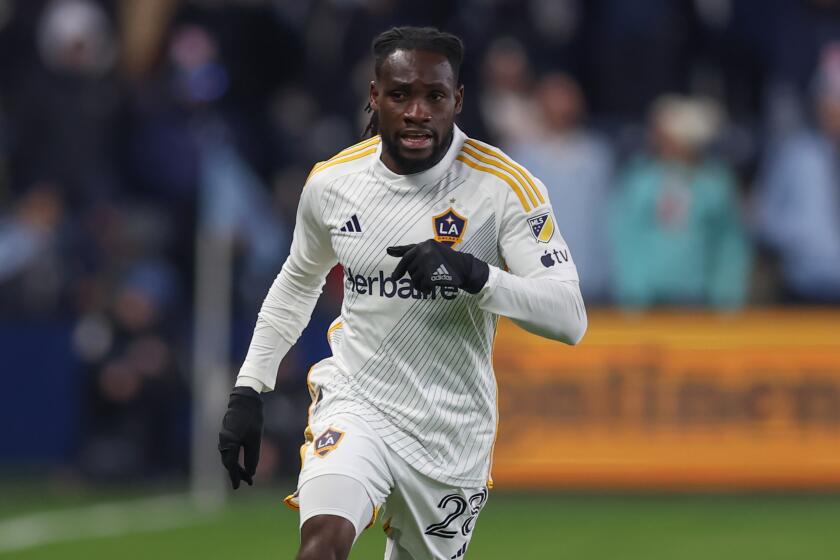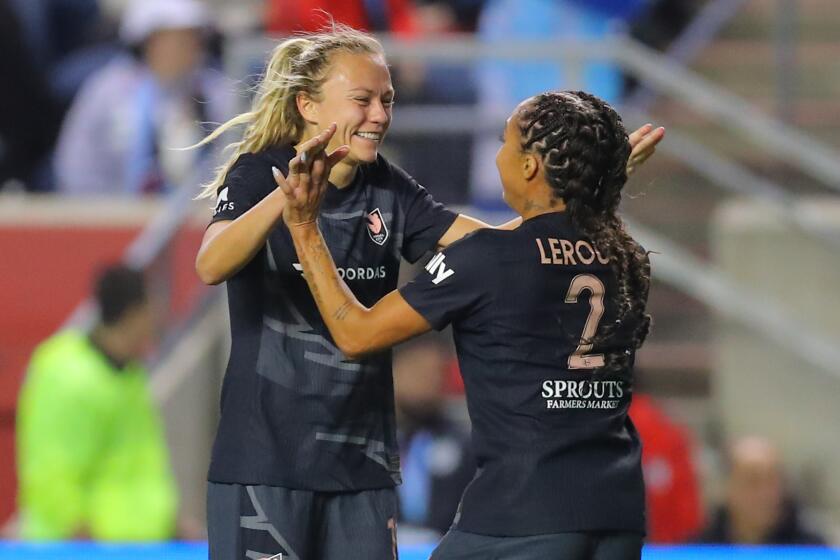In soccer, the reign in Spain is on a different plane
As far as gambles go, it was Florentino Perez who rolled the dice the hardest.
What the 62-year-old Spanish businessman did last summer was to splash out more than $355 million to bring the likes of Portugal’s Cristiano Ronaldo ($132 million), Brazil’s Kaka ($90 million), Spain’s Xabi Alonso ($48 million) and France’s Karim Benzema ($48 million) to Real Madrid.
The gamble was that a new infusion of “galacticos” would surely be enough to see Real overtake Barcelona as Spanish and, it was hoped, European champion.
Perez was clear about his ambition.
What he wanted to do, he said, was “to create a spectacular project . . . to make Real Madrid the best club in the world once more.”
Halfway through the 2009-10 season, his “project” still has a long way to go. Like many top European teams that last summer gambled that a few expensive new players or a high-profile new coach would change their fortunes, Real has not seen things quite work out its way. Not yet, anyway.
So, with due deference to King Juan Carlos and family, the reign in Spain that is most closely watched as the new year approaches is that of FC Barcelona.
Can the Blaugrana hold onto its six crowns or is one or more of them destined to be passed back to the team with the royal in its name?
What follows is a glimpse at the two Spanish powers at the season’s midpoint. Fans of Sevilla, Valencia, Deportivo La Coruna, Mallorca and all other pretenders to the title need look no further.
In Spain, there are only two teams.
The rich: Real Madrid
Despite all the glitter brought by the likes of Ronaldo and Kaka, Coach Manuel Pellegrini’s team finds itself in the same place it was at the end of last season -- behind Barcelona in the standings.
Admittedly, it is only two points behind, but considering how much Perez spent, it surely should have been ahead. The difference was a 1-0 loss to its Catalan rival in Barcelona at the end of November.
“We have been growing well since that match,” Alonso told Marca, a Madrid sports daily, on Saturday.
But there have been setbacks, the most embarrassing of which was a 4-1 aggregate ouster by third-division Alcorcon in the Spanish Cup. Real’s 4-0 first-leg loss caused hilarity in Barcelona.
Then, too, Ronaldo and Kaka have both been sidelined by injuries. Still, Real (12-2-1) is the highest-scoring team in La Liga with 40 goals so far and has made it to the final 16 of the European Champions League.
Real’s Santiago Bernabeu stadium will be the sight of the Champions League final on May 16, and Pellegrini’s aim is to win the tournament and give Madrid its 10th European crown.
He just might do so.
In its last game before the Spanish season’s midwinter break, Real Madrid thrashed Zaragoza, 6-0, playing what one newspaper called “a whirlwind of football” and showing signs of becoming what another called “an energetic, confident, devastating team.”
Pellegrini has done a masterful job in managing the talent at his disposal, and, with playmaker Kaka on the mend after a groin injury and set to return from Brazil when league play resumes in early January, 2010 might still be Real’s year.
The great: Barcelona
No team in history has achieved what Barcelona did in 2009 and it is unlikely the feat will be repeated any time soon, if ever.
Coach Josep “Pep” Guardiola’s side won the Spanish League, the Spanish Cup, the European Champions League, the Spanish Super Cup, the European Super Cup and, this month, the FIFA Club World Cup. Six trophies contested, six trophies won.
Add to that Argentine maestro Lionel Messi’s winning both European and FIFA World player-of-the-year awards and Guardiola’s picking up every coach-of-the-year award going, and it amounted to a historic year for the club.
All of which brings to mind team captain and defender Carles Puyol’s memorable statement after the Spanish Cup became the first of the trophies won way back in mid May.
“We have been strong all season. . . . Now we have to continue to try to achieve more things.”
Little did he know.
But while Barcelona (12-0-3) is unbeaten in La Liga, in the last 16 of the Champions League and still alive in the Spanish Cup, there are storm clouds on the horizon.
To start with, the club recently failed to lure Brazilian forward Robinho from Manchester City, with Joan Laporta, Barcelona’s president, stating that “the conditions we were prepared to accept for Robinho were not accepted by Manchester City,” and that the club is “very satisfied with the squad we have.”
Indeed, the only significant move Barcelona made last summer -- the only gamble it took -- was to send Cameroon striker Samuel Eto’o and a boatload of cash to Inter Milan in exchange for Swedish striker Zlatan Ibrahimovic.
That paid off, but suddenly, having won everything in sight in his first year as a top-flight coach, Guardiola, 38, is second-guessing himself. He broke down in tears after Barcelona’s 2-1 overtime victory over Estudiantes of Argentina in the FIFA Club World Cup final at Abu Dhabi in the United Arab Emirates a week ago.
“To win six successive titles is unthinkable,” he said at the time, then suggested that Barcelona was in for leaner times.
“Now we’re going to descend a bit from our stardom, but we have talent and we got here with hard work,” he said. “Six titles is unequaled [but] this brings more responsibility. We have to continue working to remain among the elite.”
Ibrahimovic will hear none of it. Having won three trophies in less than six months, he wants more.
“Before this season, nobody would have said that a team could be capable of winning it all,” he told El Mundo Deportivo. “It’s something incredible and it would have been hard to think about it before it happened, but I think we can repeat it.”
Guardiola’s success, oddly enough, has put his future in doubt. His contract expires at the end of this season and the headhunters will be out in full force.
“He needs to have the conviction” that he can continue winning at Barcelona, said Laporta, whose own presidential term also expires in 2010.
It is only intermission in Spain. The second act should be dramatic.






